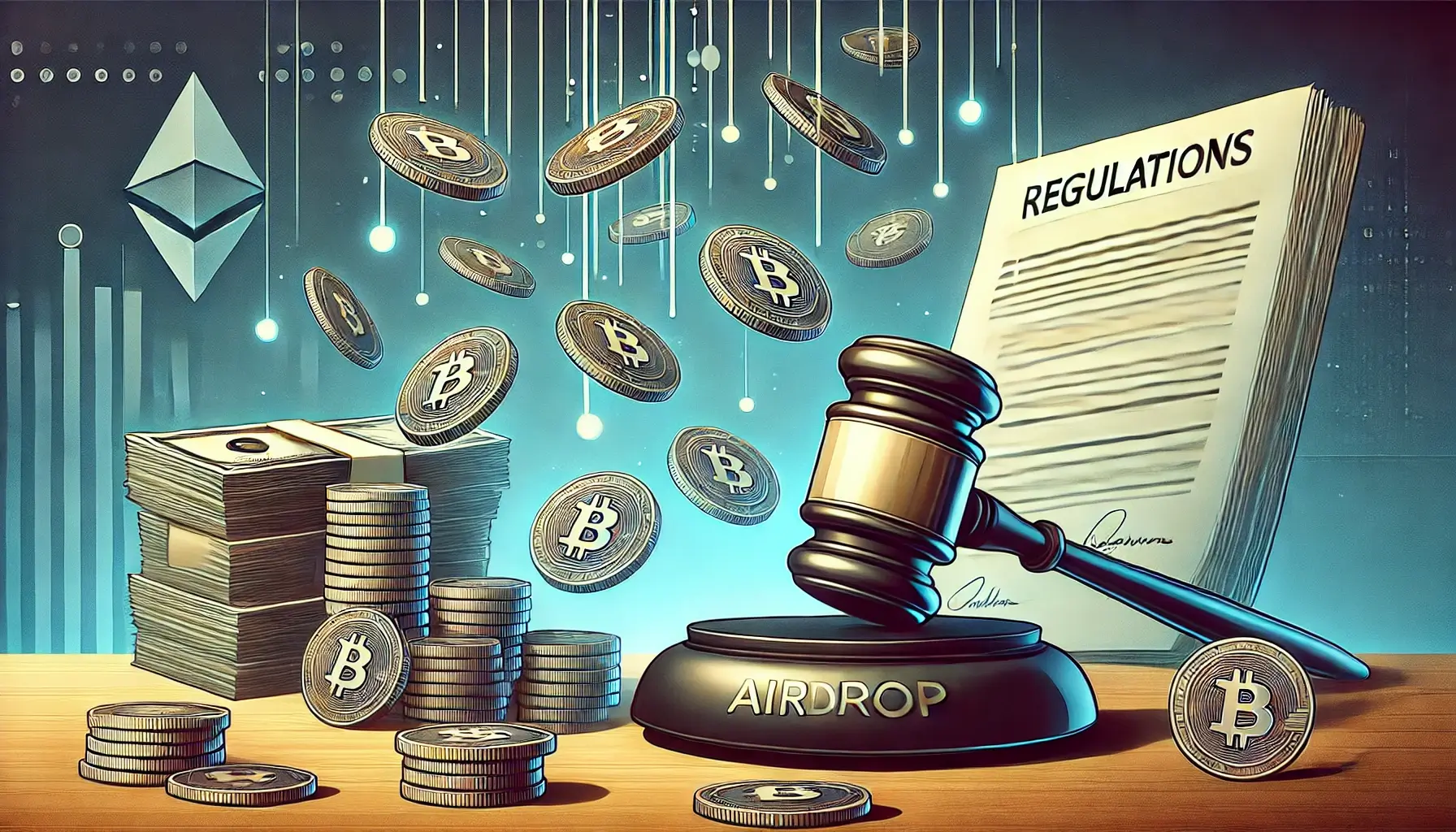Airdrops have been a key marketing tool for blockchain projects, offering a way to distribute tokens, reward users, and build communities. However, as governments around the world tighten their grip on crypto regulation, the future of airdrops is uncertain. Could crypto airdrops be subject to new legal restrictions, and what might that mean for the blockchain industry?
In this article, we’ll explore how tightening regulations could impact the future of crypto airdrops, the potential challenges for both projects and users, and what to expect as compliance becomes a critical issue.
1. The Role of Airdrops in Crypto Today
Airdrops have long served as a powerful marketing tool in the crypto world. Whether launching a new project or rewarding loyal users, airdrops distribute free tokens to wallet holders, raising awareness and building engagement. For example, Uniswap, a decentralized exchange, famously airdropped its UNI token to early users in 2020. This airdrop not only helped solidify Uniswap’s community but also increased the value of the tokens over time.
However, as crypto’s popularity has surged, so has regulatory scrutiny. Governments are no longer sitting on the sidelines, and the days of unregulated airdrops may soon be behind us.
2. How Could Regulations Impact Crypto Airdrops?
2.1. Classifying Tokens as Securities
One of the biggest challenges in the regulatory landscape is how tokens are classified. In the United States, for example, the Securities and Exchange Commission (SEC) often classifies tokens as securities under certain conditions. If a token qualifies as a security, the project behind it must comply with strict rules and regulations, including registration and disclosure requirements.
If airdropped tokens are considered securities, crypto projects might be required to:
- Register with regulatory authorities before distributing tokens.
- Provide detailed information on the project, its team, and the tokens themselves.
- Comply with Know Your Customer (KYC) and Anti-Money Laundering (AML) regulations.
This process could make it harder for smaller blockchain projects to launch airdrops, as complying with these regulations can be costly and time-consuming.
2.2. Tax Implications for Airdrop Recipients
Another aspect of regulation involves taxation. In many countries, tokens received through airdrops are considered taxable income. This means that users must report the value of their airdropped tokens and pay taxes accordingly.
For instance, in the U.S., the Internal Revenue Service (IRS) considers airdropped tokens as ordinary income at the time of receipt. This creates a complex situation for users, who may receive tokens that fluctuate significantly in value before they even have a chance to sell them.
Tightening regulations in the tax arena could discourage users from participating in airdrops, especially if the reporting process becomes overly complex or costly.
2.3. Restrictions on Cross-Border Token Distribution
As different countries begin to implement their own crypto regulations, cross-border token distributions could face additional hurdles. For example, if a project airdrops tokens to users in a country where the tokens are considered securities, but the project is not compliant with that country’s laws, it could face legal penalties.
In the European Union, the Markets in Crypto-Assets (MiCA) regulation is set to introduce a legal framework for issuing and trading crypto assets. This means that projects distributing tokens across the EU will need to comply with these new laws, further complicating the airdrop process for projects that aim for a global reach.
3. Potential Challenges for Crypto Projects and Users
As regulations tighten, both projects and users are likely to face new challenges. Let’s explore some of the most pressing concerns.
3.1. Compliance Costs for Projects
Smaller blockchain projects may find it difficult to comply with complex regulatory requirements. For example, registering a token with the SEC or conducting thorough KYC checks on all airdrop participants could require resources that many startups simply don’t have.
Additionally, projects may need to hire legal experts to ensure they’re following the law in multiple jurisdictions. This raises the cost of launching a new crypto project, possibly slowing down innovation in the space.
3.2. Decreased User Participation
From the user’s perspective, increased regulation may also be discouraging. If airdropped tokens are taxed as income, some users might be hesitant to participate, fearing unexpected tax liabilities. Moreover, complex KYC procedures can deter privacy-conscious users from getting involved in airdrop programs.
For example, a project requiring KYC for a free airdrop might alienate users who value anonymity, one of the original promises of the crypto space. This could reduce the potential reach of airdrops, limiting their effectiveness as a marketing tool.
3.3. Legal Risks for Projects and Users
Projects that fail to comply with local regulations could face significant legal consequences. This could include fines, penalties, or being banned from operating in certain countries. Similarly, users could be unknowingly participating in illegal airdrops if they fail to verify the legal status of the tokens they receive.
For instance, a user participating in an airdrop where the tokens are classified as unregistered securities could face penalties if the regulators decide to crack down on the project. As the legal environment evolves, staying informed about the regulations in your country will become crucial for both project creators and users.
4. The Future of Crypto Airdrops: What to Expect
As regulatory environments become stricter, the future of airdrops will likely involve more structure, compliance, and transparency. Here are a few possible outcomes:
4.1. A Shift Toward KYC-Compliant Airdrops
To comply with new regulations, many airdrops will likely require full KYC checks on participants. While this may go against the decentralized, anonymous ethos of crypto, it’s becoming increasingly necessary to prevent money laundering and ensure regulatory compliance.
For instance, we’re already seeing some projects, like Polymath, which offers a compliance-focused token platform, incorporating KYC into their airdrop processes. This trend is likely to grow, as regulators push for stricter rules around crypto distributions.

4.2. Geo-Restricted Airdrops
Projects may start restricting their airdrops to certain jurisdictions to avoid legal issues. For example, if a project doesn’t want to deal with the SEC, it could exclude U.S.-based participants from its airdrop. Similarly, if certain tokens are classified as securities in the EU, projects may decide to limit their airdrops to countries with less restrictive regulations.
This trend of geo-restrictions is already common in token sales and initial coin offerings (ICOs), and it’s likely to expand to airdrops as well.
4.3. Airdrops for Utility, Not Speculation
As airdrops fall under regulatory scrutiny, projects may focus more on distributing utility tokens rather than speculative assets. Utility tokens provide access to services or products within a blockchain ecosystem and are less likely to be classified as securities.
For instance, instead of airdropping governance tokens, which are often viewed as investment vehicles, projects could airdrop tokens that grant access to a particular feature of the platform, such as early access to a game or discounts on transaction fees.
Conclusion
The future of airdrops in a regulatory environment will bring both challenges and opportunities. While increased regulation could complicate the process for projects and users, it may also help create a safer, more transparent crypto ecosystem. Projects will need to adapt by complying with new laws, integrating KYC processes, and focusing on utility tokens to navigate the shifting regulatory landscape.
For users, staying informed about the legal implications of airdrops will be critical to avoid legal pitfalls and tax liabilities. The era of unregulated airdrops may be coming to an end, but a more structured, compliant future is emerging.
For more insights and detailed guides on crypto regulations, visit our Blockchain Legal Guides.
Stay Updated
For the latest news and updates on crypto regulations and airdrops, follow us on:
Stay informed with the latest strategies and insights in the world of cryptocurrency at FreeCoins24.io.
Special Offer
Looking to trade tokens securely within regulatory compliance? Sign up on Bybit today and enjoy up to $30,000 in deposit bonuses. Trade with confidence on a trusted platform while staying informed on global regulations.

















